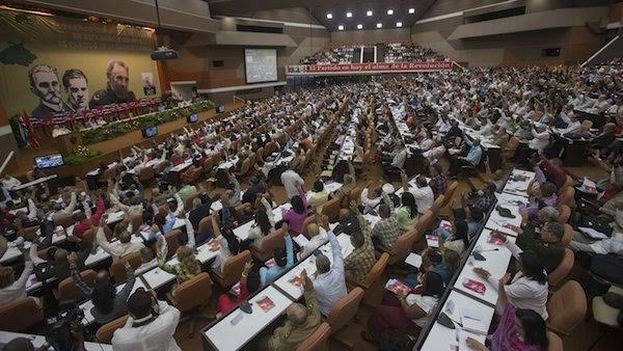
![]() 14ymedio Luis Tornés Aguililla, San Sebastien, 20 April 2016 – As the priests of old used to say: Ite, missa est, that is: Go out there and tell them what I said, this mess is over now.
14ymedio Luis Tornés Aguililla, San Sebastien, 20 April 2016 – As the priests of old used to say: Ite, missa est, that is: Go out there and tell them what I said, this mess is over now.
They closed the circle, this Communist Party Congress in Cuba that was, as always, a conclave of The Family, ending with its slogans, with its disciplined creeping things who applaud while verifying out of the corners of their eyes whether the compañero sitting next to them dared to not applaud.
It was a formality, a sort of cloister where they proclaimed the dogmatic incantations of a whole life which they themselves don’t believe in, because in Cuba as elsewhere, reality flees from artifice. Those assembled (rolling their eyes at the passion) know very well, as does Raul Castro: that’s it.
The opening speech of the sub-boss showed a real lack of respect for the Cuban people, especially when the general-president justified the existence of a single party in the political spectrum of the island; he said it with a cruel sarcasm, with that irony old men have when they know they are facing the abyss. It was a mocking self-assurance that we Cubans must not forget because it allows us to measure the enormous ideological fragility in which the regime finds itself.
We know perfectly well that if, at his age, the administrator for the Elder Idiot is amused by such antics, it is simply because the new status quo with the United States permits it. Right now, Castroism is a political circumstance under American control, a control arising from the financial accords with the Paris Club, the exchanges of every kind with the enemy, as if Havana is well worth all the senile tantrums and all the appearances of other times.
It is true that no one wants a civil conflict in Cuba, which would amount to (we have to admit it) three times the horror of the war in Syria given the grisly string of hatred and rancor accumulated since 1959. In that eventuality, the United States “apparatus” would prefer a million times and freedom-killing management of the current stiffs on tenterhooks.
The only viable option for Cuba to not cease to exist as a national entity appears to be the heroic struggle of the opposition on the island, a peaceful struggle whose vector is convincing the people that life is possible without repression, without political exiles, with decent wages and without fear. In the end, Cubans will win the battle, but the road to freedom is long.
